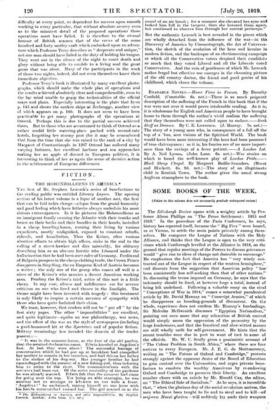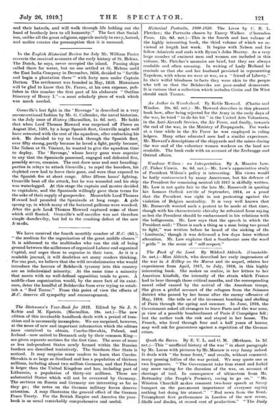SOME BOOKS OF THE WEEK.
[Notice is this eolunsn doe4 not necessarily preclude subsequent review; The Edinburgh Review opens with a weighty article by Pro- fessor Alison Phillips on "The Peace Settlement : 1815 and 1919." In the procedure of the Paris Conference, he says, history has repeated itself, because the "Big Five" were bound,' as at Vienna, to settle the main points privately among them- selves. He compares the League of Nations with the Holy Alliance, and thinks that the League is open to the very criti- cisms which Castlereagh levelled at the Alliance in 1818, on the ground that regular meetings of the Powers to discuss grievance: would "give rise to ideas of change not desirable to encourage." He emphasizes the fact that America has "very wisely con- tracted out of the League in respect of the western hemisphere," and dissents from the suggestion that American policy "has: been consistently less self-seeking than that of other nations."' In discussing the terms imposed on Germany, he says that the indemnity should be fixed, at however large a total, instead of being left undefined. Following a valuable essay on the rival "Conceptions of War in 1914," comes a somewhat paradoxical ' article by Mr. David Hannay on "Conscript Armies," of which he disapproves as breeding-grounds of discontent. On the whole, experience does not confirm Mr. Hannay's forebodings. Sir Malcolm Mcllwraith discusses "Egyptian Nationalism," pointing out once more that any relaxation of British control -- would simply mean the oppression of the peasantry by the large landowners, and that the fanatical and slow-witted masses are still wholly unfit for self-government. He hints that the recent troubles were due in part to want of tact in some of the officials. Mr. W. C. Scully gives a 'pessimistic account of ,` The Colour Problem in South 'Africa," where there are four natives to every European. Mr. J. E. G. de Montmorency, writing _on "The Future of Oxford and Cambridge," protests strongly against the apparent desire of the Board of Education to gain control over the Universities, and urges private bene- factors to emulate the wealthy Americana by re-endowing Oxford and Cambridge to preserve their liberty. An excellent number closes with an article by Mr. Harold Cox, the editor, on "The Ethical Side of Socialism." As he says, it is incredible that, "when the glorious day of the social revolution arrives, the men who have been taught to lie and to steal and to kill—ad majorem Marxi gloriam —will suddenly lay aside their weapons
and their hatreds, and will walk through life holding out the hand of brotherly love to all humanity." The fact that Social- ism, unlike all the great religions, appeals mainly to envy, hatred, and malice creates the presumption that it is unsound.



































 Previous page
Previous page